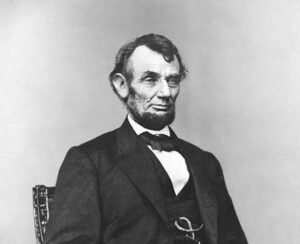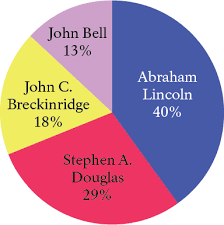by Richard Senate
 As we approach a pivotal presidential election today, it’s a fitting moment to reflect on another monumental election in American history: the election of 1860. At that time, the political landscape was fractured, with the Whig party disintegrated and the dominant Democratic party split into northern and southern factions. The newly formed Republican party, making significant strides, had nominated a one-term former Whig congressman, an Illinois lawyer named Abraham Lincoln, known as “Honest Abe.” His main opponent was Senator Stephen Douglas, “The Little Giant,” representing the Northern Democratic Party. Interestingly, both Lincoln and Douglas had vied for the affection of Mary Todd, whom Lincoln ultimately married. Their rivalry was as personal as it was political.
As we approach a pivotal presidential election today, it’s a fitting moment to reflect on another monumental election in American history: the election of 1860. At that time, the political landscape was fractured, with the Whig party disintegrated and the dominant Democratic party split into northern and southern factions. The newly formed Republican party, making significant strides, had nominated a one-term former Whig congressman, an Illinois lawyer named Abraham Lincoln, known as “Honest Abe.” His main opponent was Senator Stephen Douglas, “The Little Giant,” representing the Northern Democratic Party. Interestingly, both Lincoln and Douglas had vied for the affection of Mary Todd, whom Lincoln ultimately married. Their rivalry was as personal as it was political.
In the election year of 1860, Lincoln supporters held parades on the Fourth of July, which were both patriotic and political. Ventura’s first Fourth of July parade occurred that year, featuring a reading of the Declaration of Independence. Flags were flown over gold rush towns, and a tall flagpole was erected on what would become Main Street in Ventura, then called El Camino Real. Ventura, at that pivotal time, was little more than a village of adobe houses grouped around the old Mission Church.
 The population of Ventura in 1860 totaled 377 people, consisting of 208 men and 169 women, with 309 born in California. The demographic breakdown was as follows:
The population of Ventura in 1860 totaled 377 people, consisting of 208 men and 169 women, with 309 born in California. The demographic breakdown was as follows:
- Americans: 3 (all from New York)
- Europeans: 13 (from Spain, Italy, France, and Prussia)
- Mexicans: 17
- South Americans: 2 (from Chile and Peru)
- Native People: 12 (mostly Chumash tribe members living in town)
The census listed various professions within the township:
- Merchants: 7
- Stock Raisers: 13 (ranchers and cattlemen, then the dominant economy)
- Laborers: 13 (a term often used for cowboys at the time)
- Farmers: 6
- Saloon Keepers: 2
- Servants: 9 (cooks, maids, and possibly prostitutes)
- Painters: 1
- Midwives: 1
- Cigar Makers: 1 (possibly tobacconists)
- Hotelkeepers: 1
- Justice: 1 (likely a lawyer)
Additionally, there was an unlisted priest at the Mission San Buenaventura and a blacksmith. Spanish was the dominant language in Old Ventura.
During the 1860 election, the polling place in Ventura was set up at the Valdez Adobe near the Mission. The 1820 home of Ramon Valdez, one of the larger buildings, later became the El Viejo Adobe Restaurant. Here, all male voters in Ventura cast their ballots for “Old Abe.” The Latino population, appreciative of Lincoln’s anti-slavery stance (as Mexico had banned slavery in 1829), supported the Republicans. Despite Ventura being part of Santa Barbara County, which largely supported Douglas and the Democratic Party, Lincoln carried the state of California.
